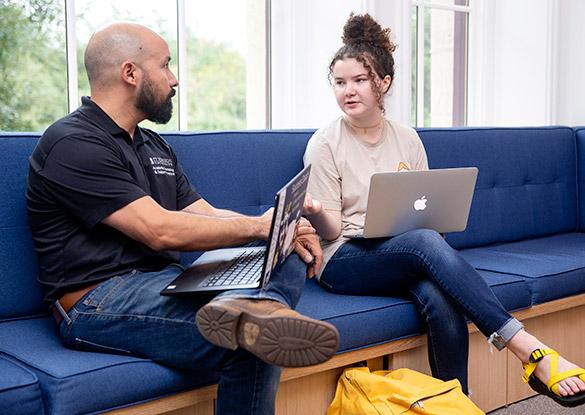Why are we attracted to some people and not others? How do addictions develop, and what breaks the cycle? How do stressful events affect people’s bodies?

Major Roadmap
Explore your options as a Behavioral Neuroscience Major — classes, internships, research, and study abroad. Find what interests you, discover what you love, and create an experience that jump starts your future using the Behavioral Neuroscience Major Guide.
The Behavioral Neuroscience degree is a good fit for students who are interested in understanding how our thoughts, feelings, and behaviors are influenced by our biology. The field explores topics that range from mental health and emotion, development, cognitive functions, evolution, sensation and perception, sleep, social behavior, to…the list goes on and on.
Students who select this major have varying interests in professional or research careers in medicine, pharmaceuticals, animal science, and neuroscience. Pre-health students find this major a good fit because the degree requirements align with medical or graduate school requirements. This major is also helpful for students interested in pursuing other types of advanced degrees.
You’ll apply what you’ve learned in the classroom to real-life situations in a mental-health and addiction facility, a hospital, a physical therapy clinic, or a research lab. When you graduate, you’ll be ready to help people by using the tools of science to solve the mysteries of human behavior.
What do our graduates do?
Behavioral Neuroscience majors go on to a variety of careers and graduate schools from St. Edward’s.
Here’s a sample.
- Business development executive for startups
- Behavioral data coordinator at MediaScience
- Neuropsychiatry research coordinator at Baylor College of Medicine
- Outreach program and data coordinator for Girls Inc.
- School psychologist in Austin Independent School District
- Graduate school placement in doctorate programs in neuroscience at Colorado State University, University of Texas, Scripps Institute, and Icahn School of Medicine
- Clinical Psychology doctorate program at Palo Alto University
- Medical school placement at various schools across the country

Find Your Place. Advocate for Others.
The possibilities for learning at St. Edward’s are practically limitless. Meet Sydney Mitchell ’19 who flourished while studying Behavior Neuroscience — and read the stories of other students who went big on the hilltop.
The Classroom and Beyond
Behavioral Neuroscience majors are outstanding scientists with excellent research skills. You’ll develop those skills in classes that include labs, so you can apply what you’ve learned, and in internships and research you conduct with professors.
Research
The Behavioral Neuroscience program helps you develop top-notch research skills. You’ll learn how to design and conduct your own study, analyze your data, and write a manuscript explaining the results.
Classes like Research Methods equip you with skills learned through hands-on experience. You’ll have the opportunity to assist faculty with their research projects and pursue your own area of inquiry. Behavioral Neuroscience majors have examined the following topics:
- The impact of recreational drug and alcohol use on stress response
- The effect on testosterone of winning or losing in a competitive situation
- The influence of race and gender on pain empathy
- How sex education shapes people’s attitudes about gender, bodily autonomy and sex
Students present their research at professional academic conferences like the Southwestern Psychological Association, the Society for Neuroscience and the Society for Behavioral Neuroendocrinology. They win national awards and are accepted into top graduate programs in the country.
Teaching Assistantships
Many students intern as research assistants for St. Edward’s professors who are conducting studies related to their specializations. Others intern as teaching assistants. At St. Edward’s, all classes are taught by professors, but student teaching assistants help tutor and lead study sessions. You’ll expand your communication and people skills by helping other students learn the material.
Degree Requirements
Major Requirements: The BS in Behavioral Neuroscience requires 63 hours of major-specific courses, which include a combination of psychology and natural sciences coursework.
Electives: Students complete 9 hours of elective courses in any area of study they choose. These courses do not have to relate to the major.
General Education Requirements: The degree requires 48 hours of general education courses that students complete over four years in addition to their major courses and electives.
View and download the full degree plan for the Behavioral Neuroscience major (PDF).
A few examples of courses students in this major take:
- Biopsychology – Delves into the function and anatomy of the nervous system and the role it plays in directing thought and behavior.
- Behavioral Neuroscience – Students will examine how the central nervous system mediates perceptions, emotions, memories, and other behaviors.
- Learning and Cognition - Students study processes that span from invertebrates to humans, drugs to disease, and theories to clinical treatment. The course examines learning principles, memory processes, and cognitive skills.
Our Faculty

Dr. Boyette-Davis' research interests focus on the mechanisms and consequences of both pain and addiction. In her teaching and research efforts, Dr. Davis seeks to develop an environment that is both challenging and encouraging.
– Jessica Boyette-Davis, Program Director and Associate Professor for Behavioral Neuroscience

Dr. Goldey enjoys working with students as they learn processes fundamental to psychological research: developing questions, reading relevant literature, collecting and analyzing data, and sharing findings with others. Dr. Goldey's research interests include hormones and behavior, evolution, human sexuality, gender, pair bonding/romantic relationships, and stress.
– Katherine Goldey, Associate Professor of Psychology and Behavioral Neuroscience
Emily Barton, Assistant Professor of Behavioral Neuroscience
Faculty Research Areas
The faculty are trained in a variety of behavioral specialties in human and non-human animals, cellular and systems neuroscience, and clinical research.
Internships
As an upperclassman, you’ll take the Research and Field Experience course, in which you’ll intern at a community organization, lab or clinical facility. Behavioral Neuroscience majors have recently completed internships at the following sites:
- MD Anderson Cancer Research Center
- The Twin Project at the University of Texas
- Pricilla Pond Flawn Child and Family Lab
- BlueSprig, which specializes in Applied Behavior Analysis therapy for children with autism
- Anxiety Treatment Center of Austin
- National Alliance on Mental Illness
- Center for Autism and Related Disorders
- Trinity Child Development Center
SEU To You
Students in Associate Professor of Psychology and Behavioral Neuroscience Jessica Boyette-Davis' Biopsychology course will explore how the brain and nervous system direct our thoughts, emotions and behaviors. They'll have in-depth discussions on subjects such as the brain science behind mental illness.